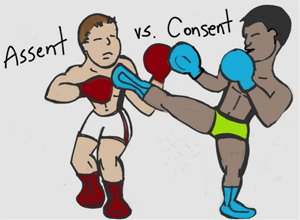 Editor’s note: Joyce M. Short is the author of “Carnal Abuse by Deceit How a Predator’s Lies Became Rape.”
Editor’s note: Joyce M. Short is the author of “Carnal Abuse by Deceit How a Predator’s Lies Became Rape.”
By Joyce M. Short
Susy’s Story
A woman we’ll call Susy met a man, Ruben, through the internet. His profile stated he was single and thirty-nine years old. He was an Army Colonel and newly back from his second tour of duty in Afghanistan. His experience had taught him how valuable family and loving relationships were, and he was determined to find the love of his life. After six months of dating, he asked for her hand in marriage.
Ruben was great with her kids. She had a nine year old boy and twelve year old girl. Their birth father was on and off drugs and in and out of employment. There was no continuity in the children’s relationship with him. Although Ruben frequently travelled for his new job, supervising the installation of environmental equipment, they had come to depend on his caring in their lives. Whenever he travelled, he’d call each evening around 9:00 PM, in time to say good night to the children and whisper “sweet nothings” to Susy.
Then Susy discovered that Ruben was married with three children, had never served in the military and was forty-six, not thirty-nine. Susy and her children were crushed. She was devastated that all his talk of marriage and their future was nothing but a smoke screen for sex with her, and that he misused her children to further embed himself into her life. She felt humiliated, not only because of her personal defilement, but also at the harm he’d caused her children.
Susy went to the police and attempted to press charges against him for sexually assaulting her. She’d never given permission to Ruben, the married forty-six year old who’d never served in the military, to have sex with her. She was devastated by his treachery. She felt raped.
The police officer at the front desk of the precinct was baffled. Why she was there? “How is this rape?” he barked in an attempt to slough off her appeals. “You consented to have sex with the guy. Didn’t you have a good time?” It was obvious that the officer had no idea that there’s a difference between “assenting” and “consenting” to an action.
So what’s the difference between assent and consent?
When someone takes unfair advantage of your lack of knowledge to trick you into touching your reproductive organs, they’re assaulting you. Why? Because they know they have not received your consent. Although you assented to their action, they clouded pertinent information that you needed in order to make a reasoned decision. “Reason” and “knowledge” is the difference between “assent” and “consent.”
Unfortunately, the penal codes of most states, even those that recognize the difference between assent and consent in other matters, fail to apply this principle to rape laws.
Zach Anderson met a young lady on the internet. They had sex. Her e-dating profile said she was seventeen. He believed her. She was fourteen, beneath the “age of consent” in most states. And why is her actual age beneath the “age of consent?” Because most states do not believe that a person below the age of seventeen can properly “reason” for themselves.
Although Zach was a victim of rape by fraud, he was charged and convicted of statutory rape. Had intercourse taken place 20 miles down the road, in the neighboring state of Indiana where he lived, he would have been allowed to enter a plea of rape by fraud as his defense. But in the state of Michigan, where his tryst with the young woman took place, he was unable to do so.
Most states make the distinction between assent and consent in a variety of their provisions
If the child were to undergo ethical research in any state, a university Institutional Review Board instructs practitioners to secure the assent of the child and the consent of their parents. They specify:
Assent is the agreement of someone not able to give legal consent to participate in the activity.
Genetics in Medicine published by The US National Library of Medicine also delineates a distinct difference between assent and consent:
“For those patients unable to provide assent, parents or guardians can provide consent, much as they would for a young child.”
Sexual consent is greatly misunderstood by society.
There is an obvious difference between nodding your head in agreement to something, and actually making a reasoned and knowledgeable decision based on the facts. And when the offender misleads you about the facts, they deliberately cloud your judgement and reasoning ability.
If they doped you, as Bill Cosby is claimed to have done to myriads of women, your assent would not constitute consent. If you are lied to, your assent does not constitute consent either.
The ItsOnUs Pledge endorsed by President Obama and Legislators around the US clearly states:
“Non-consensual sex is sexual assault.”
When you nod your head in assent it doesn’t mean that you’ve made the clear and knowledgeable determination required in consent.
Scrambling “assent” and “consent” is a sexual predator’s game
On the face of it, both assent and consent look the same. They appear to be agreement or permission. But the deeper meaning of consent makes it obvious that there is a cavernous gap between the two. And when you don’t consent to sex, you are assaulted, not seduced.
Every human body is sacrosanct
It is outrageous that every state does not recognize that human beings have the inalienable right to make their own choice over their reproductive organs based on truth, and that assent, instead of consent, simply doesn’t cut it! The sexual assault laws in most states currently punish offenders who undermine consent through:
- Violence
- Drugs
- Intoxication
- Coercion
- Being under-aged or mentally challenged
But, likewise, no one’s consent should be undermined by treachery either! And every state should recognize and punish this offense.
The internet has created a crime wave!
The CEO of the e-dating site, Beautiful People, states that over 50% of dating profiles on his elite site contain lies. Just imagine the numbers that would apply on free e-dating services. And if the offender fails to straighten out those lies prior to having sex, they have duped the victim into sexual performance. When engaging in sex with anyone you meet on the internet, you should proceed with extreme caution and check out the person thoroughly. Emotional predators can slip into your life and hook you even when you exert the utmost care. And when they do, there “oughtta be a law” to provide justice!
You can make a difference!
Please join me in raising awareness and enacting laws across the US and around the world! 50 Brave Women, (and men,) are needed to bring sex scams to a screeching halt in each of the 50 states. Please right click the link and sign up today! We can stop this crime wave. Will you be the person who takes action?




































 After the trauma, emotional exhaustion
After the trauma, emotional exhaustion
AnnettePK
Thank you for this clear explanation and helpful examples.
jm_short
You’re most welcome Annette! I truly hope many people will step forward on 50 Brave Women! It’s easy to do.
We need a unified voice in every state so legislators will make a serious effort to prevent sexual exploitation. Raising awareness is critical!
KOCHKA
Thank you for this great post. Most of difficulty in sociopath con case of love fraud or any other fraud in that matter is, so called, “undue influence”.
The basic idea is that a “concent” is valid only there is no undue influence. Most manipulation to exploit other’s resources (including sex) involve undue influence, which, under formal contractual cases, are illegal and even criminal. However, in the case listed above, this basic notion is often dismissed.
A concent under false information is called “ABUSE”. This is as simple is this.
Hope we can get this notion spread through enough in main stream thinking !!